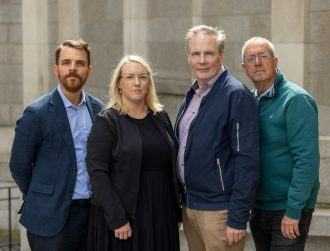Science
Dublin Universities Secure €684M in ERC Synergy Grants

The European Research Council (ERC) has awarded €684 million in funding for its latest round of Synergy Grants, with researchers from three Dublin universities among the recipients. University College Dublin (UCD), Trinity College Dublin, and Dublin City University (DCU) are included in a competitive group of 239 teams that will share this funding over six years. Each successful proposal received an average of approximately €10.3 million.
The Synergy Grants are designed to foster collaboration among outstanding researchers and encourage groundbreaking scientific discovery. Teams of two to four principal investigators (PIs) can apply, provided they can demonstrate that their project requires the combined efforts of multiple experts. Notably, at least three out of four PIs must be based in EU member states or associated countries. This year, over 40% of funded projects include at least one PI from outside the EU, reflecting the increasingly international nature of the awards.
Women represent only 25% of the researchers involved in the awarded projects, highlighting ongoing gender disparities in the field. ERC President Prof Maria Leptin noted, “Collaboration is at the heart of the ERC Synergy Grants. The competition was fierce, with many outstanding proposals left unfunded. With more funds, the ERC could fully capitalise on this wealth of first-class science.”
Two significant projects involving Irish researchers received funding in this round. At UCD, Prof Anding Zhu and Prof Bogdan Staszewski are part of the international project titled “Disrupt.” Led by Prof Leo de Vreede from TU Delft, the team also includes Prof Rüdiger Quay from Fraunhofer IAF. The project aims to develop fully digital radio-frequency (RF) power architecture, which could reduce wireless network emissions by up to 50%. This initiative is particularly timely, as wireless network emissions currently account for 2-3% of global carbon dioxide emissions, a figure expected to rise with the advent of 5G and 6G technologies.
Prof Zhu, head of the RF and Microwave Research Group at UCD, expressed enthusiasm for the grant, describing it as recognition of the “bold and interdisciplinary vision” of the Disrupt project. “This €10 million grant empowers us to push the frontiers of wireless technology by combining advanced materials science, semiconductor device innovation, and RF system architecture in a truly transformative way,” he stated.
Staszewski, also a professor at UCD, highlighted the grant as a natural progression from his previous ERC Starting Grant, noting that the team is now tackling an even greater challenge in advancing research to radio-frequency power levels thousands of times higher than before.
Meanwhile, DCU’s Prof Yvonne Daly and Trinity’s Prof Shane O’Mara are part of the “Justice” team, which will explore coercive and abusive interrogation practices. This interdisciplinary effort aims to develop more humane and effective interviewing techniques, integrating expertise from law, psychology, neuroscience, and data science. The project, titled “Justice: Joining Unique Strategies Together For Interrogative Coercion Elimination,” seeks to protect individual rights while ensuring reliable information is gathered, ultimately strengthening public trust.
Prof Daly, who teaches criminal law and evidence at DCU, expressed excitement about the potential of their collaborative work. “We’ve already learned so much from one another in devising our cross-disciplinary work programme and look forward to growing a strong team to undertake this ambitious research,” she said.
Prof O’Mara, who leads the project and is based in Trinity’s School of Psychology, emphasized the shift from confession-seeking to truth-seeking in their approach. “By combining law, psychology, neuroscience, and data science, we’ll attempt to pinpoint when and why coercion creeps into interviews and devise practical ways to prevent it. Our project goal is humane, reliable interviewing that protects the innocent, supports victims, and strengthens public trust in justice.”
The Justice team also includes Prof Dave Walsh from De Montfort University and Dr Bennett Kleinberg from Tilburg University.
In a statement regarding the funding announcement, Ekaterina Zaharieva, European Commissioner for Start-ups, Research and Innovation, highlighted the international composition of this year’s awardees. “Europe’s frontier research has never been so international,” she noted. “This global collaboration strengthens European science, gives our researchers access to world-class expertise and infrastructure, and brings leading scientists from around the world closer to Europe.”
The ERC Synergy Grants represent a significant investment in collaborative research, underscoring the vital role of interdisciplinary efforts in addressing complex global challenges.
-

 Health2 months ago
Health2 months agoNeurologist Warns Excessive Use of Supplements Can Harm Brain
-

 Health2 months ago
Health2 months agoFiona Phillips’ Husband Shares Heartfelt Update on Her Alzheimer’s Journey
-

 Science3 weeks ago
Science3 weeks agoBrian Cox Addresses Claims of Alien Probe in 3I/ATLAS Discovery
-

 Science2 weeks ago
Science2 weeks agoNASA Investigates Unusual Comet 3I/ATLAS; New Findings Emerge
-

 Science2 weeks ago
Science2 weeks agoScientists Examine 3I/ATLAS: Alien Artifact or Cosmic Oddity?
-

 Science2 weeks ago
Science2 weeks agoNASA Investigates Speedy Object 3I/ATLAS, Sparking Speculation
-

 Entertainment4 months ago
Entertainment4 months agoKerry Katona Discusses Future Baby Plans and Brian McFadden’s Wedding
-

 World2 months ago
World2 months agoCole Palmer’s Cryptic Message to Kobbie Mainoo Following Loan Talks
-

 Entertainment3 months ago
Entertainment3 months agoEmmerdale Faces Tension as Dylan and April’s Lives Hang in the Balance
-

 Science2 weeks ago
Science2 weeks agoNASA Scientists Explore Origins of 3I/ATLAS, a Fast-Moving Visitor
-

 Entertainment4 months ago
Entertainment4 months agoLove Island Star Toni Laite’s Mother Expresses Disappointment Over Coupling Decision
-

 Entertainment3 months ago
Entertainment3 months agoMajor Cast Changes at Coronation Street: Exits and Returns in 2025









